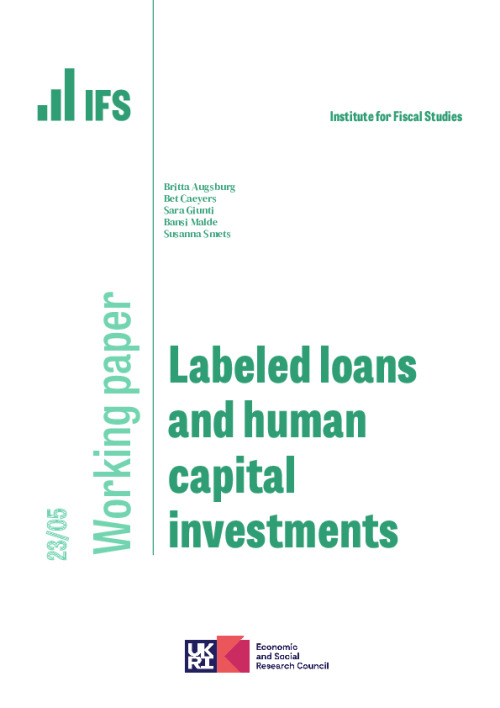Downloads

WP202305-Labeled-loans-and-human-capital-investments.pdf
PDF | 950.23 KB
Imperfect capital markets and commitment problems impede lumpy human capital investments. Labeled loans have been postulated as a potential solution to both constraints, but little is known about the role of the label in influencing investment choices in practice. We draw on a cluster randomized controlled trial in rural India to test predictions from a theoretical model, providing novel evidence that labeled microcredit is effective in influencing household borrowing and investment decisions and increasing take-up of a lumpy human capital investment, a toilet.
Authors

Associate Director
Britta is an IFS Associate Director, Associate Staff at the Department of Economics at the UC and Researcher at NIHR Obesity Policy Research Unit.

Research Associate Yale University, Stockholm University and FAIR/Norwegian School of Economics (NHH)
Bet is a Research Associate of the IFS who is an Adjunct Associate Professor at FAIR/Norwegian School of Economics (NHH).

Sara Giunti

Research Fellow University of Kent
Bansi is a Research Fellow of the IFS, a Senior Lecturer of Economics at the University of Kent and also a Fellow at the Global Labor Organisation.

Susanna Smets
Working Paper details
- DOI
- 10.1920/wp.ifs.2023.0523
- Publisher
- Institute for Fiscal Studies
Suggested citation
Augsburg, B et al. (2023). Labeled loans and human capital investments. 23/05. London: Institute for Fiscal Studies. Available at: https://ifs.org.uk/publications/labeled-loans-and-human-capital-investments (accessed: 30 June 2024).
More from IFS
Understand this issue

If you can’t see it, you can’t be it: role models influence female junior doctors’ choice of medical specialty
24 April 2024

What does the Conservative's higher education announcement this week mean for apprenticeships and 'low-value' university courses?
1 June 2024

Sure Start achieved its aims, then we threw it away
15 April 2024
Policy analysis

How do the last five years measure up on levelling up?
19 June 2024

Labour’s ‘Growth and Skills’ levy would give more flexibility to firms – but employers would still need to get on board
1 June 2024

The short- and medium-term impacts of Sure Start on educational outcomes
9 April 2024
Academic research

Targeting men, women or both to reduce child marriage
28 May 2024

Keeping the peace whilst getting your way: Information, persuasion and intimate partner violence
17 May 2024

The role of hospital networks in individual mortality
13 May 2024